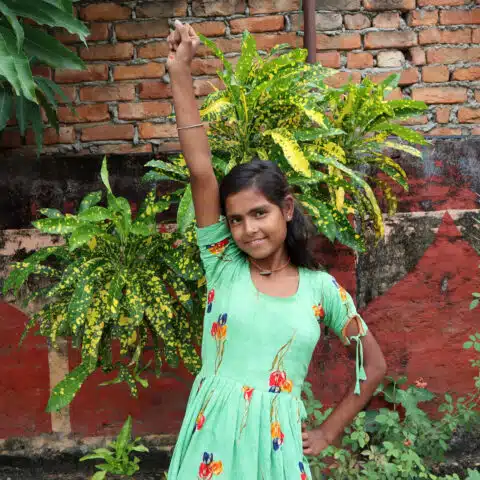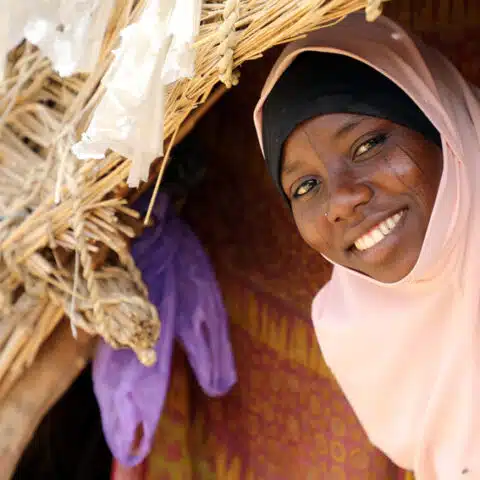End Child Marriage
Every girl deserves to learn and thrive. And decide when and if she wants to marry.
Photo: Parmin*, 13, was nearly married off when she was 12. © Plan International / Mushfiqul Alam
While early and child marriage affects both girls and boys, the impact on girls is much greater. Girls growing up in poverty or facing crisis, conflict or disaster are particularly at risk.
Child marriage violates girls’ human rights and robs them of their childhood. Girls who are married before they turn 18 are more likely to experience domestic violence and less likely to stay in school. They are often forced to have children before their bodies are ready.
In communities where child marriage happens, we’re working with girls to make sure they know their rights. We’re educating families on the risks of child marriage, as well as supporting communities to make sure girls are valued and their voices are heard.
Donate now to end child marriage
A girl who dared to say no to societal pressure
At just 15-years-old, Fanta, a young refugee from Nigeria, faced the social and cultural pressures of an arranged marriage to a man three times her age. Although her father dictated this fate, Fanta courageously defied the established norms and succeeded in breaking off the marriage.
Forced to leave her home and seek refuge in Niger more than four years ago due to attacks in her country by armed groups, Fanta and her family live in precarious conditions. So when a sizable dowry was offered, her father accepted.
It was very devastating news for me, I started crying. I told my mother that I wasn’t interested in marriage. I wanted to continue my business of selling pancakes and also learn sewing so that I could become a fashion designer.Under extreme pressure, Fanta even considered ending her life, but was saved by a neighbour who took her to a Plan project volunteer. With the intervention of the protection committee, led by the village head, mediation was held between Fanta and her father who eventually agreed to call off his daughter’s wedding.
With Plan’s help, Fanta was able to use some of the seed money she received from the project to start her business to pay back her dowry, using what was left over to buy herself a sewing machine.
Fanta conviction has given other girls in her community the courage to follow her example.
The support Fanta received formed part a protection project run by Plan International in Niger, which aims to ensure access to inclusive, quality education and livelihood opportunities for children and young people affected by the complex humanitarian crisis in Diffa and Tillabéri regions.
Photo: Fanta, 15, defied the established norms and broke off her marriage. © Plan International
Why does child marriage happen?
- Gender inequality: girls and women often occupy a lower status as a result of social and cultural traditions, attitudes and beliefs that deny them their rights.
- Poverty: in families on a low income, girls may be seen as an economic burden. The perception that a girl’s potential to earn an income is comparatively poor pushes girls out of their homes and into marriage.
- Customs: in many countries, the importance of preserving family ‘honour’ and girls’ virginity means parents push their daughters into marriage before they’re ready. People believe marriage safeguards against ‘immoral’ or ‘inappropriate’ behaviour.
- Failure to enforce laws: sometimes families aren’t aware they’re breaking the law. In some countries early marriage is so prevalent, prosecutions are seldom brought.
- Conflicts, disasters and emergencies: disasters and emergencies increase economic pressures on households and many families who wouldn’t previously have considered early marriage turn to it as a last resort.
- Lack of education: girls with no education are more likely to be married before the age of 18 than those with a secondary education.
Our work to end child marriage
We’re tackling child marriage around the world by:
- educating local communities on the risks and impacts of the practice.
- training case workers who can intervene in suspected cases of forced child marriage.
- creating safe spaces, education and support networks so girls are supported to refuse marriage and build their own lives.
- providing medical treatment and counselling to help girls recover from child marriages.
- campaigning at a regional, national and international level to influence policies and legislation to end violence against girls.
Learn more
Say ‘I Do’ to ending child marriage
You can create choices which prevent girls from experiencing the lasting trauma of child marriage.





